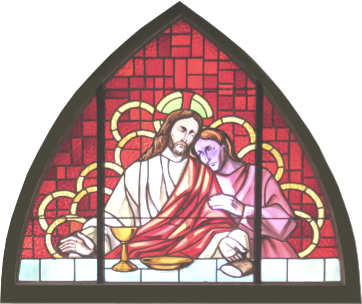The Divine Mercy
April 27, 2015
Download a printable pdf version
 Our Lord Jesus Christ is “The Divine Mercy” and the “Prince of Peace”! He loves us infinitely and has immeasurable
Our Lord Jesus Christ is “The Divine Mercy” and the “Prince of Peace”! He loves us infinitely and has immeasurable
mercy for sinners. He is Love and Mercy itself. He wants all souls to go to Heaven to be with Him forever.
Trials and Temptation
Despite how hard we try to do God’s will, sometimes we fall into temptation and fail miserably. But God understands how difficult it is for us. He is merciful—if we pick ourselves up, repent and try again. The Bible says, “[L]et the wicked forsake their way, and the unrighteous their thoughts; let them return to the LORD, that He may have mercy on them, and to our God, for He will abundantly pardon. For My thoughts are not your thoughts, nor are your ways My ways, says the LORD. For as the heavens are higher than the earth, so are My ways higher than your ways and My thoughts than your thoughts” (Isai 55:7-9).
Jesus asked St. Faustina Kowalska to promote His Divine Mercy to the world; and to write His words to her in a diary. So in her Diary, Divine Mercy in My Soul, she wrote: “My daughter, write that involuntary offenses of souls do not hinder My love for them or prevent Me from uniting Myself with them. But voluntary offenses, even the smallest, obstruct My graces, and I cannot lavish My gifts on such souls. … I detest the smallest sin. I cannot love a soul which is stained with sin; but when it repents, there is no limit to My generosity toward it. My mercy embraces and justifies it. With My mercy, I pursue sinners along all their paths, and My Heart rejoices when they return to Me. I forget the bitterness with which they fed My Heart and rejoice at their return” (Diary, 1641, 1728).
The Sacrament of Reconciliation
Our loving God does not give up on us. The Divine Mercy offers us a way out of our misery. We are truly blessed to belong to the Holy Catholic Church that Jesus instituted 2,000 years ago. The Sacraments of the Catholic Church are powerful. In the Sacrament of Confession (also called the Sacrament of Reconciliation), Jesus can cleanse our souls of all our sins. We can start anew with the wealth of spiritual guidance that we will receive from the priest in the confessional. Also, once we are cleansed of all mortal sins, we can receive the Holy Eucharist at Mass during Communion. Jesus is alive and present in the Eucharist—Body, Blood, Soul and Divinity. We can become united with our loving and merciful God in this wonderful way! In this way we receive inner healing and are filled with the Prince of Peace in our souls.
Jesus spoke to St. Faustina Kowalska about the Sacrament of Reconciliation. She wrote in her Diary that Jesus said to her: “Pray for souls that they be not afraid to approach the tribunal of My mercy [the Sacrament of Reconciliation]. Do not grow weary of praying for sinners. You know what a burden their souls are to My Heart. Relieve My deathly sorrow; dispense My mercy. …Write, speak of My mercy. Tell souls where they are to look for solace; that is, in the Tribunal of Mercy [the Sacrament of Reconciliation]. There the greatest miracles take place [and] are incessantly repeated.
“To avail oneself of this miracle, it is not necessary to go on a great pilgrimage or to carry out some external ceremony; it suffices to come with faith to the feet of My representative [a Catholic priest] and to reveal to him one’s misery, and the miracle of Divine Mercy will be fully demonstrated. Were a soul like a decaying corpse so that from a human standpoint, there would be no [hope of] restoration and everything would already be lost, it is not so with God. The miracle of Divine Mercy [the Sacrament of Reconciliation] restores that soul in full.
“Oh, how miserable are those who do not take advantage of God’s mercy! You will call out in vain, but it will be too late” (Diary, 975, 1448).
Pope Benedict XVI
Pope Benedict XVI spoke about the Sacrament of Reconciliation—God’s wonderful gift to us—in his Address to Participants in the Course on the Internal Forum Organized by the Apostolic Penitentiary, March 25, 2011. The Holy Father emphasized the importance of our examination of conscience, confession of sins and commitment to continuous conversion. He said, “Examination of conscience has an important pedagogical value. It teaches us how to look squarely at our life, to compare it with the truth of the Gospel and to evaluate it… Comparison with the Commandments, with the Beatitudes and, especially, with the Precept of love, constitutes the first great ‘school of penance’. …
“Moreover the integral confession of sins teaches the penitent humility, recognition of his or her own frailty and, at the same time, an awareness of the need for God’s forgiveness and the trust that divine Grace can transform his life. Likewise, listening to the confessor’s recommendations and advice is important for judging actions, for the spiritual journey and for the inner healing of the penitent. Let us not forget how many conversions and how many truly holy lives began in a confessional! The acceptance of the penance and listening to the words ‘I absolve you from your sins’, are lastly, a true school of love and hope that guides the person to full trust in the God Love, revealed in Jesus Christ, to responsibility and to the commitment to continuous conversion.”
Help Jesus Save Souls
We can help Jesus save souls while we suffer physically or mentally. We can tell Jesus that we join our suffering to His Holy Passion and offer it all to our heavenly Father for ourselves, or for a loved one, or for all souls. In this way we can receive some joy in suffering and a sense of relief, knowing that our suffering isn’t for nothing, that it is doing some good.
St. Peter wrote, “[I]f any of you suffers as a Christian, do not consider it a disgrace, but glorify God because you bear this name. … Therefore, let those suffering in accordance with God’s will entrust themselves to a faithful Creator, while continuing to do good” (1 Pet 4:16,19).
Another way that we can help Jesus save souls is to offer every Holy Mass we attend for one or more souls. We can do this by praying to Jesus in our hearts, at the time of the Prayer of the Faithful, or at the Offertory of the Mass. The Holy Sacrifice of the Mass is powerful in saving souls. This is because the Passion of Jesus on the Cross is made present at every Mass, and we can offer His sacrifice for souls.
St. Faustina Kowalska wrote in her Diary, Divine Mercy in My Soul: “Today Jesus said to me, ‘I desire that you know more profoundly the love that burns in My Heart for souls, and you will understand this when you meditate upon My Passion. Call upon My mercy on behalf of sinners; I desire their salvation. When you say this prayer, with a contrite heart and with faith on behalf of some sinner, I will give him the grace of conversion. This is the prayer: O Blood and Water, which gushed forth from the Heart of Jesus as a fount of Mercy for us, I trust in You’ ” (Diary, 186, 187).
Spread the Faith
Those of us who are devout Catholics have the responsibility to spread the faith. In this way we can help Jesus spread His Divine Mercy to people. To Who? To anyone God puts in our path. How? By our words, our actions and our prayers. Often we have difficult decisions to make. We are sometimes under a lot of pressure to do what we feel is wrong. We have to ask ourselves: what would Christ do in such and such a case? For instance, a woman, a family member, wants to move in with her boyfriend although they are not married, and wants financial assistance, or they want to live together in your house. What would Jesus do? Help someone to commit a mortal sin? No. It may not be easy to say no. But if we give in, we will become part of the problem and receive the mortal sin on our soul, too. Sometimes “tough love” is the only way to live according to the teachings of Jesus Christ and to spread the faith. May Jesus help us to act righteously, despite having to upset someone who won’t get what they want. Jesus said to St. Faustina, “Do not be surprised that you are sometimes unjustly accused. I Myself first drank this cup of underserved suffering for love of you. …It is because you are not of this world that the world hates you. First it persecuted Me. Persecution is a sign that you are following in My footsteps faithfully” (Diary, 289, 1487).
Another way to spread the faith is to help an organization or group of people who are doing wonderful faith-filled things. For example, our Archdiocese has notified us on the Canadian pro-life issue regarding euthanasia and assisted suicide. We can write to our Members of Parliament on this moral issue, to help souls.
Conclusion
All we have to do, is do whatever we can to do the will of God in our lives. We just have to keep in mind that Jesus is “The Divine Mercy” and the “Prince of Peace”. He loves us infinitely and has immeasurable mercy for sinners. May we love Him and please Him in return.

